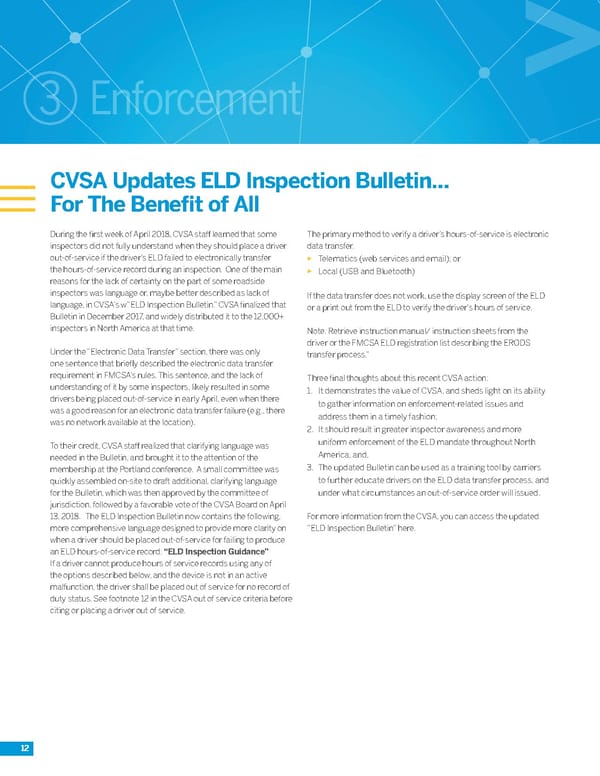12 3 Enforcement During the first week of April 2018, CVSA staff learned that some inspectors did not fully understand when they should place a driver out-of-service if the driver’s ELD failed to electronically transfer the hours-of-service record during an inspection. One of the main reasons for the lack of certainty on the part of some roadside inspectors was language or, maybe better described as lack of language, in CVSA’s w“ELD Inspection Bulletin.” CVSA finalized that Bulletin in December 2017, and widely distributed it to the 12,000+ inspectors in North America at that time. Under the “Electronic Data Transfer” section, there was only one sentence that briefly described the electronic data transfer requirement in FMCSA’s rules. This sentence, and the lack of understanding of it by some inspectors, likely resulted in some drivers being placed out-of-service in early April, even when there was a good reason for an electronic data transfer failure (e.g., there was no network available at the location). To their credit, CVSA staff realized that clarifying language was needed in the Bulletin, and brought it to the attention of the membership at the Portland conference. A small committee was quickly assembled on-site to draft additional, clarifying language for the Bulletin, which was then approved by the committee of jurisdiction, followed by a favorable vote of the CVSA Board on April 13, 2018. The ELD Inspection Bulletin now contains the following, more comprehensive language designed to provide more clarity on when a driver should be placed out-of-service for failing to produce an ELD hours-of-service record: “ELD Inspection Guidance” If a driver cannot produce hours of service records using any of the options described below, and the device is not in an active malfunction, the driver shall be placed out of service for no record of duty status. See footnote 12 in the CVSA out of service criteria before citing or placing a driver out of service. The primary method to verify a driver’s hours-of-service is electronic data transfer. ► Telematics (web services and email); or ► Local (USB and Bluetooth) If the data transfer does not work, use the display screen of the ELD or a print out from the ELD to verify the driver’s hours of service. Note: Retrieve instruction manual/ instruction sheets from the driver or the FMCSA ELD registration list describing the ERODS transfer process.” Three final thoughts about this recent CVSA action: 1. It demonstrates the value of CVSA, and sheds light on its ability to gather information on enforcement-related issues and address them in a timely fashion; 2. It should result in greater inspector awareness and more uniform enforcement of the ELD mandate throughout North America; and, 3. The updated Bulletin can be used as a training tool by carriers to further educate drivers on the ELD data transfer process, and under what circumstances an out-of-service order will issued. For more information from the CVSA, you can access the updated “ELD Inspection Bulletin” here. CVSA Updates ELD Inspection Bulletin... For The Benefit of All
 Roadmap to the ELD Mandate Page 11 Page 13
Roadmap to the ELD Mandate Page 11 Page 13